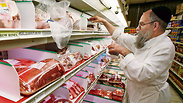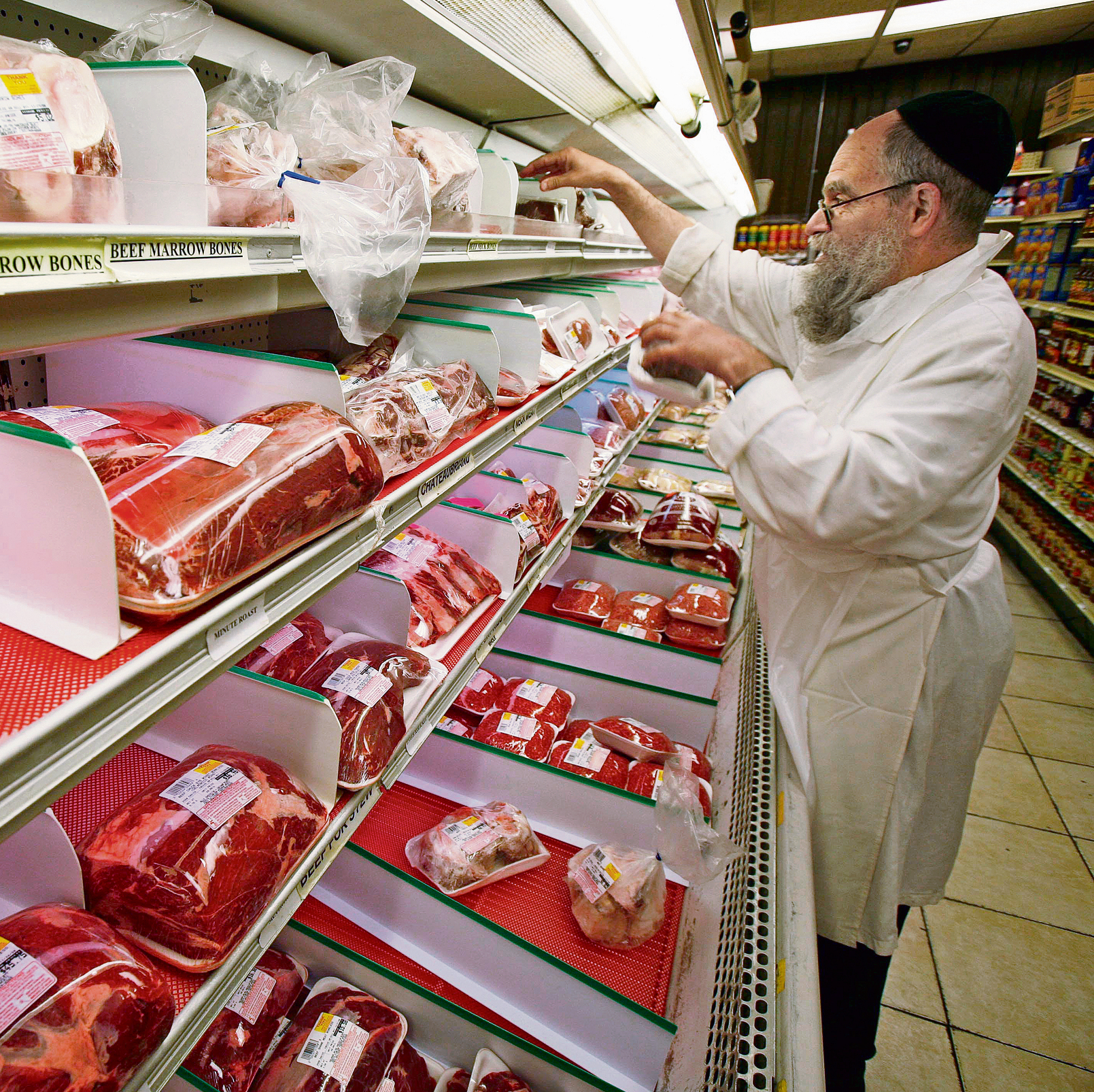
Kosher meat in Europe
Photo: AP
There aren’t many things that the Jewish and Muslim European communities agree on, after the recent years’ wave of anti-Semitism and terror. However, during the past year, the two communities found themselves uniting against a common enemy: the threat to cancel religious slaughter around the continent.
Several countries have already tried to pass laws against kosher (Jewish) and halal (Mulsim) slaughter, claiming the two methods promote animal cruelty. Unlike methods considered more humane, both forms of religious slaughter forbid stunning the animal before it is killed. So far, Muslim and Jewish Europeans have been able to unite over this matter and claim that religious slaughter constitutes religious freedom, and that banning it won’t allow them to perform these practices on European soil.
In Britain, a bill to ban kosher slaughter was dropped, while in other countries there were attempts to ban circumcision alongside religious slaughter—but no bill has as yet been successful.
However, this fine balance is now in danger as on January 1, one of Belgium's three counties banned religious slaughter, and a second is expected to follow later this year. The new law has already led the Israeli government to declare it would summon the Belgian ambassador for clarification, expressing concern the ban would open the door to other similar laws that won’t allow Jews to practice their traditional lifestyle in Belgium.
“This is a sad day for European Jewry,” says Rabbi Pinchas Goldschmidt, President of the Conference of European Rabbis. A local Belgian Rabbi, Yaakov David Schmahl, from Antwerp, said the law “definitely brings to mind similar situations before the Second World War, when these laws were introduced in Germany.”
Belgium followed in the footsteps of five other countries that passed a similar law: Sweden, Norway, Iceland, Denmark and Slovenia—but it’s the first country with a substantial Jewish and Muslim population to do so. Out of 11 million Belgian citizens, half a million are Muslims and 35,000 are Jewish, and the main kosher slaughterhouse in Antwerp, home of the country's biggest and wealthiest Jewish community, also supplies Kosher meat to other countries in Europe, including Britain.
“This is a shameful decision. It will undoubtedly lead to debates about circumcision, freedom of worship and educational programs in Jewish schools, as it did in the other countries (that passed the bill),” says European Jewish Association Chairman, Rabbi Menachem Margolin. “Coming from a country where the royal family is known to enjoy hunting for sport, it’s hard to comprehend why kosher slaughter—that comprises less than one percent of the slaughtered animals in the Belgium—should be on the top of the agenda.”
Far-right for animal rights
The ban on kosher slaughter in Belgium alarms European Jewish communities, who worry it will cause kosher meat prices to spike throughout the continent, causing a shortage of supplies and making the traditional lifestyle possible only for wealthy Jews. “This ban is insensitive and unnecessary… those who mean to forbid Jews from performing religious duties send a message—whether they mean to or not—that Jews aren’t welcomed here,” says Moshe Kantor, president of the European Jewish Congress. “We will continue to fight and insist on having freedom of practice, which is one of the basic rights in the European constitution.”Not only did the Jews and Muslims bond over the religious slaughter law—but so did two opposing political camps in the continent. The initiative came from the Belgian far-right and from animal welfare organizations, who traditionally belong to the left. The latter see religious slaughter as inhumane, since animals suffer for a longer time before the pass in comparison to common slaughter practices. Several European countries have laws that determine animals have to suffer as little pain as possible during slaughter, usually executed by inserting local anesthesia before the throat is slit, or by killing the animal with an electrical shock or a stun gun.
“They want to keep living in the Middle Ages and continue to slaughter without stunning — as the technique didn’t yet exist back then — without having to answer to the law,” said Ann De Greef, director of Global Action in the Interest of Animals, a Belgian animal rights group. “Well, I’m sorry, in Belgium the law is above religion and that will stay like that.”
Brussels Chief Rabbi Avraham Gigi thinks the law passed since animal rights activists have a powerful lobby in Belgium. “No parliament member will confront them,” he said. “It’s hypocritical, since hunting is allowed in Belgium, it causes animals greater suffering. We’re afraid of a snowball effect that will cause other European countries to to ban kosher slaughter.”
Both Jewish and Muslim communities rushed to the defense of religious slaughter, claiming it takes into consideration the pain the animals suffer, and that it is a humane practice. According to religious organizations, the new law isn’t out to protect animals, but rather to stigmatize and discredit religious communities.
“There’s no proof that the new methods are more humane than kosher slaughter,” says Rabbi Gigi. “On the contrary, we handed in depositions from leading veterinarians and neurologists who specialize in pain, and they proved that kosher slaughter causes less suffering.”
Far-right groups, who reject religious and cultural practices different to theirs, joined forces with animal rights organizations. The Belgian bill to ban religious slaughter was filed by Ben Weyts, a right-wing Flemish nationalist minister who is responsible for animal welfare and a known associate of an elderly politician who collaborated with Nazi forces during WWII. Just six months ago, an Austrian extreme-right politician, Gottfried Waldhäusl of the Freedom Party, tried to pass a similar bill, proposing that Jews and Muslims who buy kosher and halal meat be registered in a special database. The proposal was justified as proecting animal rights, but it was clear there was an alternative agenda.
A European dilemma
So far, European countries are debating the need to allow freedom of worship while also fighting animal cruelty. Despite rigid laws, Germany and the Netherlands allow Jews and Muslim to preserve their autonomy regarding slaughter, under please for freedom of religious practice.Yohan Benizri, President of the Coordinating Committee of Belgian Jewish Organizations, filed a petition to the Supreme Court against the new law on slaughter, on the grounds that religious freedom must be preserved as long as it doesn’t harm other Belgian citizens, “just as it was prior to this law.”
Right-wing Belgian organizations, on the other hand, dismiss these claims as hypocritical, saying the state is obliged to protect animal rights, but betrays this duty when it comes to minorities. In 2012, French extreme-rightist Marine Le Pen tried to pass a bill against religious slaughter, claiming that “90% of the slaughter in and around Paris is for halal purposes.” She even made it a talking point of the 2017 elections.
Initiatives to ban circumcision have also popped up in different places around Europe, but were never legislated, since many European politicians fear of being seen as anti-Semitic, Islamophobic or of handing in a victory to the blooming far-right around the continent.
Despite failed attempts, a 2012 German court verdict determined that “circumcision changed a child’s body in a way that cannot be amended, and denies him the right to decide his religious tendencies himself.” In 2013, the European Council called its 47 members to “initiate a public debate, including intercultural and interreligious dialogue, aimed at reaching a large consensus on the rights of children to protection against violations of their physical integrity according to human rights standards.”
In 2018, Iceland was the first European country to ban circumcision, and set a precedent that alarmed European Jews. However, only several months after the legislation, the Icelandic government reversed the law on account of religious freedom.
Meanwhile, the Antwerp community is stunned over the new kosher slaughter law, fearing the closing of the central slaughterhouse will mark the end of Jewish prosperity in the city—a community that was only restored in the 1960s after it was annihilated during the Holocaust. Of course, meat can be imported from Brussels, where the law doesn't apply, but the community’s main concern is a general feeling of being unwelcome. Fearing for the future of their traditional lifestyles, Jews and Muslims are now uniting to protest together. It appears peace between the two communties might come from the fight against a common enemy.

















